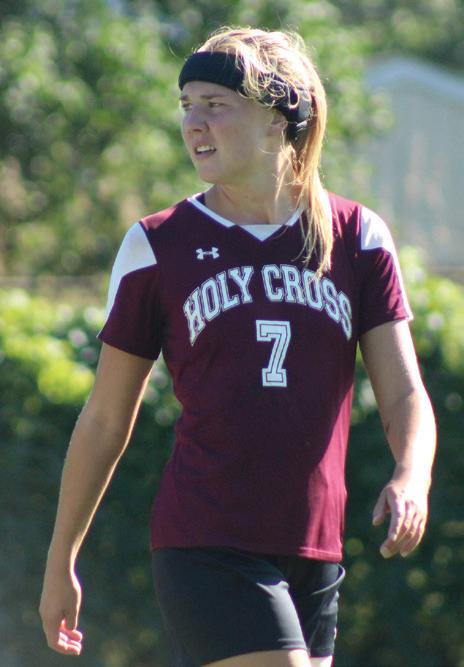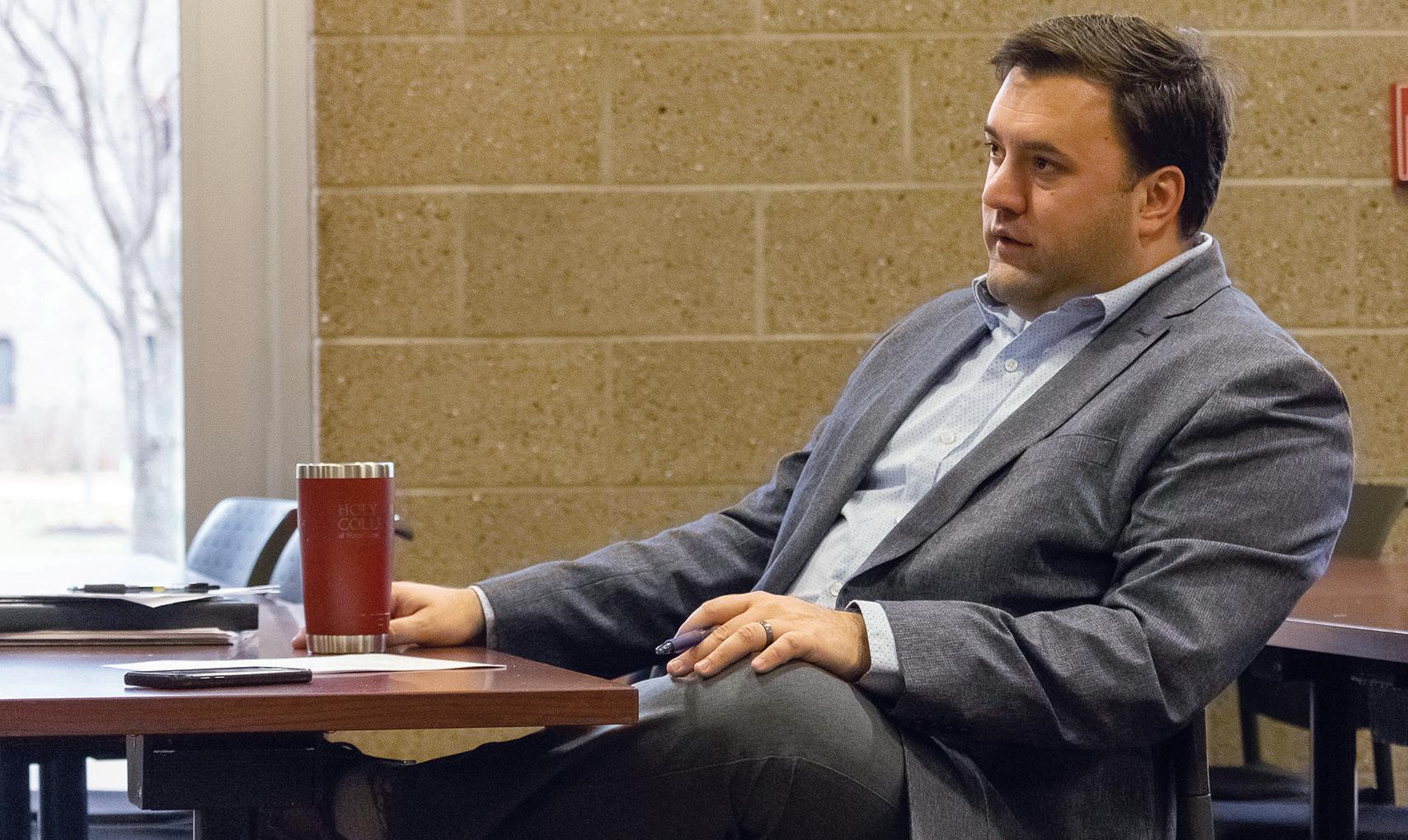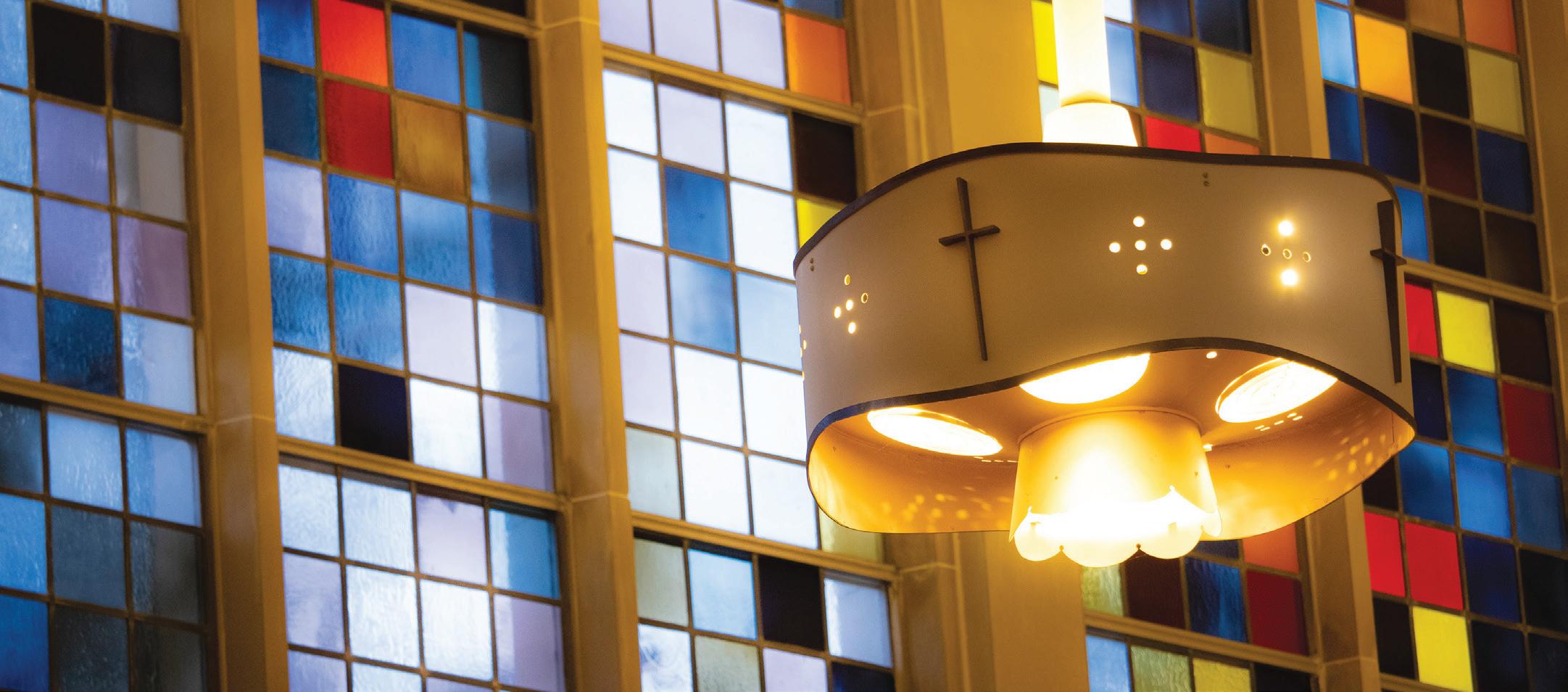
13 minute read
Fulbright Program
Fulbright Program Fostering Life-Long Scholarship
Holy Cross College encourages their students to look beyond the classroom and turn their
sights globally, toward the vast opportunities that the world has to offer after graduation. The
revitalized Fulbright Program, now run by Associate Professor of Business Dr. Michael
Hartmann, gives students the chance to do so 1 . By exposing students to this opportunity, Father
David Tyson, C.S.C. hopes to produce a Holy Cross Fulbright Scholar during his tenure as President.
By fostering and encouraging life-long scholarship, the Fulbright highlights the Scholar Pillar of Holy Cross. Father Tyson can attest to this through his previous involvement with the program during his time as President of the University of Portland. He witnessed the transformative influence of the program and hopes to translate its success to Holy Cross College.
“Holy Cross is at a stage of its development that it can look out further and stretch itself academically. Additionally, having a Fulbright scholar and program offers our institution visibility and credibility,” Father Tyson stated. “The Fulbright aligns with Holy Cross’ mission for globalization and academics; so, to not offer the Fulbright program would not only be to miss an opportunity, it would be shortsighted of us.”
1 EDITOR’S NOTE: History Professor Dr. Angel Cortez previously aided prospective Holy Cross students who expressed interest in the Fulbright program. In the past, one Holy Cross student applied, but did not get offered a spot.
The Fulbright program consists of two different year-long, fully funded opportunities for US citizens who have completed their bachelor’s degree: teach English to students abroad or conduct research in a foreign country. Both of these options urge students to act as a United States ambassador during their time abroad. In addition, the Fulbright program attracts foreign researchers and scholars to the United States by offering opportunities to research and experience a culture different from their own.
Father Tyson selected Dr. Hartmann for the position of Fulbright Program Advisor due to his international background. During his fifteen years of living and teaching in Germany, Hartmann spent time investigating the Fulbright Program on behalf of his university. He plans to utilize this information and his personal foreign experience to influence, inspire, and aid Holy Cross students who are looking to apply and ultimately act as an American ambassador of culture after they graduate.
By attending a training session hosted by Wayne State University, Hartmann now possesses the knowledge to help students and faculty with the extensive application process. Although students do not hear back about their spot in the program until the end of their senior year, the Fulbright requires students to start expressing interest by April of their junior year. This way, students have time to gather all the right materials before the final application is due in October (of the student’s senior year). Between April and October, Hartmann will help students put together compelling applications and concise resumes. Because of the small size of Holy Cross, Hartmann will have time to seek out, get to know, mentor, and develop strong and competitive Holy Cross applicants.
To ignite the process and inform students and faculty of this opportunity, Hartmann plans to set up a Moodle page for students with easy access to information by this upcoming Spring Semester. Furthermore, he hopes to create a system to identify potential Fulbright candidates.
In addition to producing a Holy Cross Fulbright scholar who would travel abroad, Hartmann seeks to invite an international visiting professor to the College for an academic year to teach Holy Cross students or to host a researching foreign scholar. This would add a new layer of culture to the campus.
Both Hartmann and Father Tyson stress the importance of starting early in developing a successful application package. From diving deep into a foreign language to participating in the Global Learning trips to Peru, Uganda, and India, students should take advantage of the opportunities that Holy Cross has to offer and demonstrate a worldly mindset during their time in school. “A successful applicant would be a tangible sign that we are fulfilling our mission to produce global citizens in the intellectual tradition of Holy Cross,” Hartmann concluded.
— Dr. Michael Hartmann, Associate Professor of Business, Holy Cross College
Pia de Solenni, Ph.D., is a moral theologian and cultural analyst. She most recently served as Chancellor of the Diocese of Orange and Theological Advisor to the Bishop. She delivered this lecture in the Pfeil Center’s McKenna Arena on Holy Cross College’s campus last October.

Women in the Body of Christ
Mother Teresa, during the Synod for Women Religious in 1994, took the microphone in the middle of a long debate about women having more power in the Church. She noted that the context was all wrong. And, in her classic straightforward abrupt manner, admonished her fellow women religious that they needed to stop talking about power and fall in love with Jesus who is their spouse.
Obviously, the conversation about women’s leadership in the Catholic Church needs to continue to develop. But I think St. Teresa of Calcutta offered us an important consideration. When people are in love, they do not speak of power. Conversations about power only come up in settings where there is no love, where there is a lack of love, or where love has been abused.
Yet the situation she addresses goes back to the condition of our first parents, Adam and Eve. They were given and promised love. Instead, they chose power. As a result, they lost love and never gained power.
When I present the theology of women, I prefer to focus on a constructive setting of love. Questions of power rarely have a legitimate context in Catholic culture where the greatest (especially those privileged with ordination) is called to serve the least. Instead, I like to situate the conversation in the context of love and there is no greater love than Christ crucified who, after his resurrection, established his believers as his body, indicating a profound unity and a deep love for every human person.
Certainly, there are innumerable ways in which humans treat each other terribly, abusively. But we don’t have the means to address those unless we look at a better way of existing together. Otherwise, how can we offer an alternative?
For more than a century, various forms of feminism have been proposed. Sadly, many of them only seem to reduce women to the role of acting as “men behaving badly.” We have had decades of women being told in various ways that they’re not good enough. There is perhaps no clearer case than when a stay-at-home mom is asked something along the lines of, “Yes, but what do you do?”,
insinuating that somehow the role which she has chosen to prioritize is lacking because it does not confer a worldly title, much less a substantial paycheck. For all the freedom women in the developed nations are supposed to have, one could argue – and I do – that we are actually quite constricted in the freedom to make choices about how we choose to use our talents and spend our time, as if we were not competent to make that decision.
We have also lost the sense of relation. The Body of Christ functions because all of the parts work in relation, specifically a relation of love, with each other. Take away love, both as the foundation and operating principle, and the body cannot exist.
At the close of the second Vatican

Council, Pope Paul VI offered that the future of the world depended upon women. Surveying, the mess that feminism had become in some places, St. John Paul II, promoting what he termed a “new feminism,” offered that we had to be freed from the box of so-called “feminism.” Decades later, Cardinal Ratzinger (who later became Pope Benedict XVI) maintained that women have a role in every aspect of society. In 2013, Pope Francis called for a theology of women to be developed and articulated.
Over the course of my study of feminist and gender theories alongside the teachings of the Catholic Church, I am convinced that we need to recover something that has been lost in order to build something new.
Historically, the Catholic Church

was the first major religion to require the same initiation rights for women and men: baptism. It is the first large-scale religious or government entity to allow women to make choices about how to live their own lives, born witness by the radical tradition of female martyrdom and women religious. Prior to the Church, no mainstream religion or substantial government advanced the education of all women, regardless of social standing.
The Church, while divinely instituted, is also run by humans; so not all of these changes happened at once. There were developments and there continue to be. Nevertheless, it was a Church founded on the radical equality of women and men,
(continued on next page.)



(continued from previous page.)
called to experience.
otherwise both would not have been subject to the same rite of initiation. And the Church continued to be the first in these changes while other religions and governments lagged behind. Indeed, the radical equality of all humans, as put forth by the Church, continues to provide a great hurdle for the world.

Naturally, questions of women’s ordination will come to mind. These are important areas to explore. Again, returning to my thesis that we need to recall and relearn the tradition of the Church on women, I am concerned that the conversations are mistakenly focused on power, and that the role of women in the Church becomes relegated to a role that few men are

Recently, I served as Chancellor of one of the largest dioceses in the United States. I was by no means the first. Similarly, there are many women serving as CFOs and in other leadership capacities. While Canon Law stipulates that the bishop is the sole decision maker in his diocese, it does not preclude the bishop from delegating this responsibility to others, including women.
And, if we listen honestly to priests, we’ll find that many of them have little or no experience of power because they take a vow of obedience to their bishop or religious superior. In fact, my work with priests often leaves me grateful that I am a lay woman with infinitely more choices and even more power.
The Catholic Church is only about 2,000 years old. There are other older religions. 2,000 years is almost infinitely young when compared to a universe that evidence suggests is exponentially older. While 2,000 years may seem a long time to us as humans with a much shorter life expectancy, perspective can help us to understand that the work of the Church will in all likelihood continue for at least many centuries, if not millennia, to come. As a colleague once noted to me, there could come a time in history when members of the Church look back on our time and regard us as the early Church, much as we regard the Church of the first century.
Therefore, the work that we do now to further our understanding of the role of women in the Body of Christ could have implications for billions of souls in the millennia to come. At the very least, it can help us here and now to understand how God intended women and men to work together in a context of supernatural love.



Being a scholar goes beyond the classroom
by Lucy Campos ‘21
The first day of school has always been a favorite of mine— the new school supplies, the opportunity to make new friends, a new space to make my own. There was always something special about walking into a new classroom and seeing what it had to offer. To me, a good classroom was essential to my learning. Of course, as time passed, this dynamic changed. Instead of a designated English or science classroom, different rooms are used for a variety of courses. I no longer had a consistent room or space to count on. While relatively terrifying at first, this change taught me one of the greatest lessons of my life: being a scholar goes beyond the walls of a classroom.
This past summer I spent two months living, learning, and interning in Washington, D.C. Through a program called “Leadership and the American Presidency,” co-sponsored by The Fund for American Studies in conjunction with the Ronald Reagan Presidential Foundation and Institute, I had the opportunity to take courses at George Mason University and intern for the Congressional Hispanic Leadership Institute. The things I had learned in a classroom turned into skills and knowledge that I could apply to the things I was doing in our nation’s capital. Along with this, my learning and education continued. I was learning about political theory and other big topics in a classroom, just as I was witnessing the inner workings of all these things in real life and real-time. I met and heard from Senator Angus King who gave great advice such as “regret the things you did, not the things you didn’t do” and “when in doubt...don’t get married.” I fangirled over shaking Senator Marco Rubio’s hand—maybe not a movie star, but the man was a presidential candidate. I also attended a variety of briefings and events on Capitol Hill and at some of our nation’s biggest think tanks. The things I read about in some of my textbooks were real and all around me. I realized then that I would never stop being a scholar with the world as my classroom.
While a traditional definition would tell you that a scholar is a distinguished academic or an educated specialist, my time at Holy Cross College has taught me that an education is so much more than memorizing things from a textbook. I have no doubt that rigorous courses and work have enabled me to discuss academic topics such as the biopsychosocial model, political theory, and the marriage plot. I’ve learned that being a scholar means stepping out of my comfort zone, taking in the world around me, and taking any and every opportunity to learn.

EDITOR’S NOTE: Lucy Campos is currently a junior majoring in English and Psychology with a minor in Political Science. Lucy is president of the Holy Cross Psi Chi chapter, which is the international honor society for psychology. She has also presented research at the Midwestern Psychological Association Conference as well. Lucy is a member of the Sacred Heart Parish Choir at the University of Notre Dame. She is a first-generation student that hails from Elkhart, IN.










